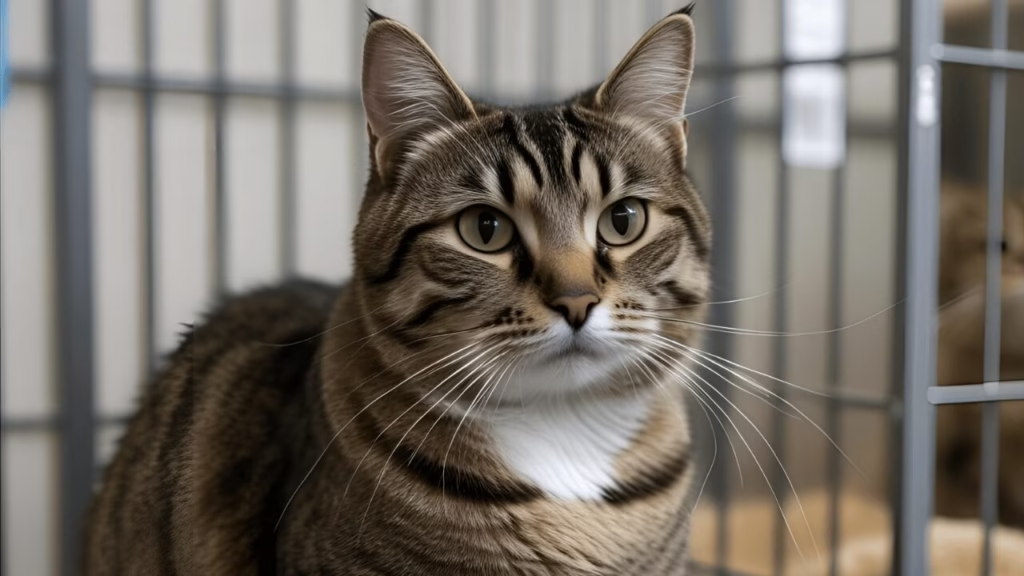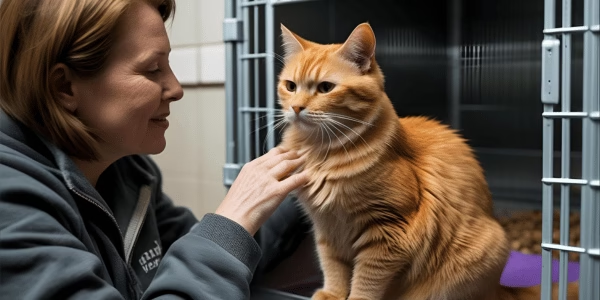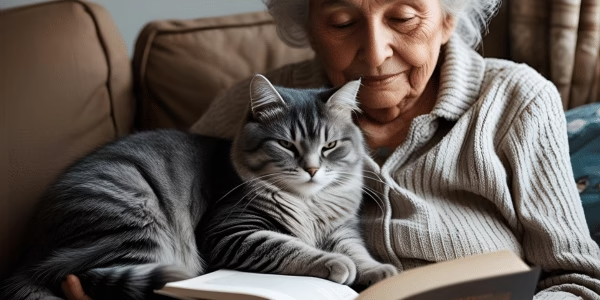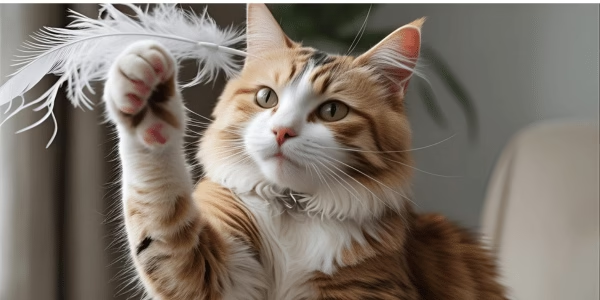Picture this: You walk into your local animal shelter, and while everyone’s crowding around the kitten cages, there’s a distinguished tabby in the corner, quietly observing the world with wise, gentle eyes. That’s your future best friend right there – and here’s why the benefits of adopting a senior cat might just blow your mind.
Look, we get it. Kittens are adorable with their tiny squeaks and playful antics. But before you let those baby blues win you over, let’s talk about why adopting a senior cat could be one of the smartest decisions you’ll ever make. These mature felines bring something special to the table that younger cats simply can’t match – experience, gratitude, and a whole lot of love to give.
On the same topic, check out our What to expect when adopting a senior cat article
1- What You See Is What You Get: Established Personalities
Here’s the thing about senior cats – they’re like that friend who’s completely comfortable in their own skin. Unlike kittens whose personalities are still developing, senior cats (typically 7 years or older) come with fully formed, predictable temperaments.
When you meet a gentle giant purring in your lap at the shelter, you can be confident that same affectionate nature will shine through at home. No surprises, no wondering if your playful kitten will turn into a couch potato or if your calm baby will become a furniture-destroying tornado. Senior cats offer the ultimate “what you see is what you get” package.
The shelter staff know these cats inside and out – whether they get along with other pets, how they react to children, and what their quirks are. This means you can make an informed decision and find your perfect match without the guesswork.
2- Mellow Yellow: The Joy of Lower Energy Requirements
If you’ve ever lived with a kitten, you know the drill – 3 AM zoomies, climbing curtains, and enough energy to power a small city. Senior cats? They’ve got their priorities straight.
Older cats are naturally more mellow and prefer the finer things in life – like a sunny windowsill, a cozy lap, and quality time with their favorite humans. They’re not going to be bouncing off the walls or requiring constant entertainment. Instead, they’ll curl up next to you while you binge-watch Netflix, perfectly content to just be in your presence.
This makes them ideal companions for people with busy lifestyles, elderly individuals with limited mobility, or anyone who appreciates a more relaxed pet experience. You’ll still get playtime and interaction, but on a much more manageable scale.
3- Instant Gratitude: The Strongest Bonds You’ll Ever Experience
Here’s something that might surprise you – senior cats often form stronger bonds with their adopters than younger cats do. Think about it: these cats have been through a lot. They understand what it means to lose a home, and they don’t take your kindness for granted.
Adult cats express significantly more gratitude and love than kittens who might take your care for granted. There’s something incredibly moving about watching a senior cat slowly learn to trust again, knowing that you’re the person who gave them a second chance at happiness.
Many adopters report that their senior cats seem to understand they’ve been rescued, leading to an almost immediate bond that’s both touching and rewarding. It’s like they’re saying “thank you” every single day through their purrs, head bumps, and gentle presence.
4- Budget-Friendly Adoption: More Bang for Your Buck
Let’s talk dollars and cents for a moment. Adopting a senior cat is often significantly more cost-effective than bringing home a kitten. Most senior cats come already spayed or neutered, fully vaccinated, and microchipped – procedures that can cost hundreds of dollars if done separately.
Many shelters also offer special pricing or even free adoptions for senior pets, recognizing that these animals need extra help finding homes. Organizations often provide ongoing support, including discounted veterinary care or free follow-up visits to ensure your new companion settles in well.
While it’s true that senior cats may require more frequent veterinary check-ups (typically twice yearly instead of annually), the initial adoption savings often offset these costs. Plus, you’re investing in a cat who’s already house-trained and socialized – no kitten training required.
5- Perfect Companions for Every Lifestyle
Whether you’re a busy professional, a retiree looking for companionship, or a family wanting a gentle pet, senior cats adapt beautifully to various living situations. Their calmer dispositions mean they’re less likely to cause stress in multi-pet households and more likely to peacefully coexist with children and other animals.
Senior cats are particularly perfect for senior citizens because their energy levels often match perfectly. There’s something beautiful about two beings in their golden years finding comfort and companionship in each other.
For working professionals, senior cats offer the perfect balance – they’re independent enough to handle alone time but affectionate enough to provide meaningful companionship when you’re home. No need to worry about coming home to shredded furniture or knocked-over plants.
6- Health and Longevity: Busting the Myths
One of the biggest misconceptions about senior cat adoption is that these cats won’t live long. This simply isn’t true. With proper care, many senior cats live well into their late teens or even early twenties. People have shared experiences adopting 12-year-old seniors who lived to be 22, while their younger kittens sadly passed away before reaching one year due to blood disorders.
Modern veterinary medicine has made tremendous advances in managing age-related conditions. While about 30% of cats aged 11-14 may develop some form of kidney disease, with proper management, many cats with these conditions live comfortable lives for years.
The key is regular veterinary care and being proactive about health management. Many senior cats actually become more energetic and comfortable after addressing issues like dental disease or arthritis.
7- House-Ready and Well-Trained
Here’s a practical benefit that every cat owner can appreciate – senior cats typically come fully house-trained and socialized. No litter box training, no teaching basic manners, no wondering if they’ll scratch your furniture to shreds.
These cats have lived in homes before and understand the rules of indoor living. They know what a litter box is for, they understand that scratching posts are preferable to your couch, and they’ve likely mastered the art of using their indoor voice (most of the time).
Senior cats may settle in more quickly to new environments because they’re used to experiencing new sights and sounds. Their familiarity with home environments and experience living with humans often leads to smoother transitions than you might expect with a kitten.
8- Surprising Adaptability and Learning Ability
Contrary to the old saying, you absolutely can teach an old cat new tricks! Cats can form new neural pathways well into their golden years, meaning senior cats are still capable of learning and adapting. Experts have worked with 13-year-old tabbies who learned to high-five for treats within just two weeks of adoption.
This adaptability extends beyond tricks to genuine behavioral adjustments. Senior cats can learn new routines, adapt to new family members, and even adjust to living with other pets when introduced properly.
9- The Emotional Rewards: Healing Together
There’s something profoundly healing about rescue cat adoption, especially when it involves a senior cat. These cats have often been through significant life changes – losing their original families, spending time in shelters, or experiencing uncertainty about their future.
When you adopt a senior cat, you’re not just gaining a pet; you’re participating in a beautiful story of second chances and resilience. Many adopters find that caring for a senior cat who’s been through challenges helps them process their own life experiences and find meaning in providing comfort and security to another living being.
10- Making Space for More Rescues
Every time someone adopts a senior cat, they’re literally saving a life while making space in the shelter for another animal in need. Senior cats are often among the last to be adopted and, tragically, sometimes the first to be euthanized due to space constraints.
By choosing senior cat adoption, you’re not just changing one cat’s life – you’re contributing to a larger cycle of rescue and care that benefits the entire animal welfare community.
Ready to Meet Your Perfect Senior Companion?
The benefits of adopting a senior cat extend far beyond what we’ve covered here. These remarkable animals offer wisdom, gratitude, and unconditional love in ways that might surprise you. They’re not looking for someone to complete them – they’re complete already and ready to share their golden years with someone special.
Your next step? Visit your local animal shelter or browse senior cats available for adoption online. Don’t just walk past those older faces – take time to meet them, learn their stories, and see if one of these amazing animals might be your perfect match. In case you need some guidance, our Complete Shelter Cat Adoption Guide will provide you with everything you need in your adoption process.
Remember, when you adopt a senior cat, you’re not just gaining a pet – you’re becoming a hero in their story and discovering that sometimes the best things in life come with a little gray around the whiskers.
Frequently Asked Questions About Senior Cat Adoption
How long do senior cats typically live after adoption?
With proper care, many senior cats live 5-10+ years after adoption, with some reaching their early twenties. Age at adoption doesn’t necessarily predict lifespan – health status and care quality are more important factors.
Are senior cats more expensive to care for?
While senior cats may require more frequent vet visits, the initial adoption costs are often lower since they’re already spayed/neutered and vaccinated. Many shelters also offer ongoing support for senior pet adopters.
Will a senior cat bond with my family?
Absolutely! Senior cats often form stronger, more grateful bonds than younger cats. Age doesn’t determine a cat’s ability to love and form new relationships.
What special accommodations do senior cats need?
Some may need easily accessible litter boxes, comfortable bedding for arthritic joints, or ramps to reach favorite spots. However, many senior cats require no special accommodations at all.
Are senior cats good with children and other pets?
Many senior cats are excellent with families because their personalities are well-established. Shelter staff can help match you with a cat whose temperament fits your household.
Resources
- https://www.petfinder.com/cats/
- https://www.vet.cornell.edu/departments-centers-and-institutes/cornell-feline-health-center






